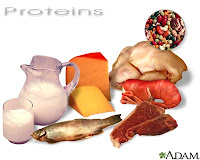Don’t Spare the Protein
Wednesday, July 2, 2008 To anyone trying to lose weight, avoiding the virtually obligatory reduction in lean body mass is always a challenge. Not only does “offloading” as the body gets lighter reduce the actual “weight-bearing” work resulting in loss of muscle mass, but also the fact that most dietary recommendations tend to also reduce protein intake to maintain a “balanced” diet can promote a protein catabolic state.
To anyone trying to lose weight, avoiding the virtually obligatory reduction in lean body mass is always a challenge. Not only does “offloading” as the body gets lighter reduce the actual “weight-bearing” work resulting in loss of muscle mass, but also the fact that most dietary recommendations tend to also reduce protein intake to maintain a “balanced” diet can promote a protein catabolic state.
As skeletal muscle is a major determinant of energy expenditure, losing muscle mass eventually limits the amount of weight that can be lost at any given caloric deficit, resulting in an early plateau. Furthermore, as lost lean body mass tends to be replaced with fat during weight regain (catch-up fat), you end up with a greater fat mass than before your diet.
The importance of maintaining protein intake during diet-induced weight loss was again illustrated in a recent study by Melanie Bopp and colleagues from Wake Forest University School of Medicine, Winston-Salem, NC, published in the Journal of the American Dietetic Association.
The authors investigated the association between dietary protein intake and loss of lean mass during weight loss in postmenopausal women through a retrospective analysis of a 20-week randomized, controlled diet and exercise intervention in women aged 50 to 70 years. Weight loss was achieved by differing levels of caloric restriction and exercise. The diet-only group reduced caloric intake by 2,800 kcal/week, and the exercise groups reduced caloric intake by 2,400 kcal/week and expended approximately 400 kcal/week through aerobic exercise.
Lean mass was measured using DEXA. Average weight loss was 10.8+/-4.0 kg, with an average of 32% of total weight lost as lean mass. While protein intake averaged 0.62 g/kg body weight/day (range=0.47 to 0.8 g/kg body weight/day), participants who consumed higher amounts of dietary protein lost less lean mass. These associations remained significant after adjusting for intervention group and body size.
The authors conclude that inadequate protein intake during caloric restriction may be associated with adverse body-composition changes in postmenopausal women.
I would dare to add that the same is probably true for anyone undergoing a dietary weight loss intervention that does not maintain adequate protein intake.
AMS
Edmonton, Alberta


